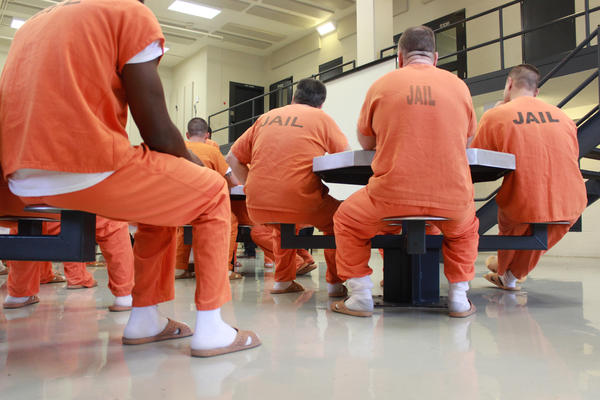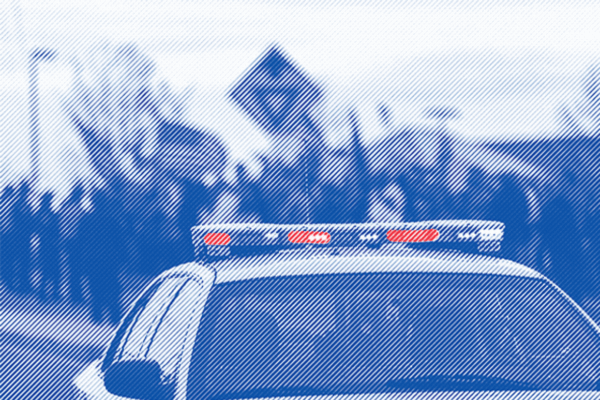AUSTIN, TX - Governor Abbott unlawfully exceeded his constitutional authority by issuing an executive order that suspends the rights that individuals, who are presumed innocent, have while facing criminal prosecution, according to a new lawsuit filed by the ACLU of Texas, Texas Fair Defense Project, the ACLU’s Criminal Law Reform Project and the Lawyers’ Committee for Civil Rights Under Law.
The lawsuit, filed today in the State District Court of Travis County, is on behalf of the misdemeanor magistrate judges of Harris County, three criminal defense non-profit organizations and the NAACP of Texas. It states that the Governor’s March 29 order, GA-13, unlawfully attempts to remove discretion from judges about who can receive personal bonds and suspend certain laws related to decisions about who can be released on personal bond, while the Texas Constitution clearly states that those decisions lie with the Judiciary and the power to suspend laws lies only with the Legislature. The lawsuit argues that the Texas Disaster Act also does not grant the Governor with this authority.
The lawsuit also states that GA-13 creates an unconstitutional wealth-based system by banning the use of personal bonds for certain people, putting pre-trial freedom out of the reach of those unable to pay cash bail.
“The Texas Constitution makes it clear: the Governor does not have the authority to suspend state law, particularly those that govern our criminal justice system, even during an emergency,” said Andre Segura, legal director for the ACLU of Texas. “At a time when public health experts agree that limiting the population in jails is critical to prevent outbreaks of COVID-19, this order ties local officials’ hands in trying to mitigate the impact of the pandemic for all Texans and prevent loss of life. Under this order, those unable to afford bail are required to ride out a pandemic in the dangerous setting of a jail, while wealthier people are able to buy their way out.”
The plaintiffs include the Texas Criminal Defense Lawyers Association, Austin Criminal Defense Lawyer Association, and Capital Area Private Defender Service, the Texas State Conference of NAACP Units, and all Harris County misdemeanor judges. The executive order harms the plaintiffs in different ways: for the judges, it unilaterally abridges the discretion given to them by law and the constitution; for the criminal defense organizations, it renders advising clients difficult and responding to the unique challenges it creates has subsumed their work; and harms the diverse membership of the NAACP, which includes judges, defense lawyers, prosecutors, county commissioners and jail staff in a multitude of ways.
“Governor Abbott’s illegal executive order disproportionately keeps poor people, people of color, and in particular African Americans jailed and therefore at a heightened risk of contracting COVID-19,” said Arthur Ago, criminal justice project director for the Lawyers’ Committee for Civil Rights Under Law. “These individuals, many of whom are legally innocent, have the right to petition for their freedom—a right that the governor has unconstitutionally taken from them. The governor must be prohibited from enforcing this executive order.”
“This order is creating uncertainty and havoc in the courts, and disrupting the potentially life-saving efforts of local officials to reduce their jail populations in light of the COVID-19 crisis,” said Amanda Woog, executive director of the Texas Fair Defense Project. “The harms of this order are not abstract: poor people are being detained pretrial with no way to escape a possible jail outbreak. The governor has overstepped his legal authority, and this is causing significant harm on the ground.”
“While we understand the Governor was trying to address this health emergency, it is abundantly clear to us that he is invading the province the Texas Constitution provides to our judges when exercising their responsibilities according to law,” said Gary Bledsoe, president of the Texas Conference of the NAACP. “It’s also clear that the Executive Order no doubt will have dire consequences for inmates as well as correctional officers and staff. We know this from the numerous examples regarding how quickly the coronavirus can and does spread without regard to race, income, class or status. The virus isn’t stopped by jail cells or other such barriers. To the contrary, jails increase the rates of coronavirus infection. For all those reasons it’s best to leave the decisions of how to stem the spread of the coronavirus in the jails and prisons to judges. Under our laws, they are the ones who are best suited to make those decisions.”
The ACLU of Texas had previously led a coalition of civil rights leaders in calling on Gov. Abbott and nearly 500 other state and local criminal legal stakeholders to limit the population in jails and prisons to reduce the danger of COVID-19 outbreaks.
Stay Informed
Sign up to be the first to hear about how to take action.
By completing this form, I agree to receive occasional emails per the terms of the ACLU’s privacy statement.
By completing this form, I agree to receive occasional emails per the terms of the ACLU’s privacy statement.


